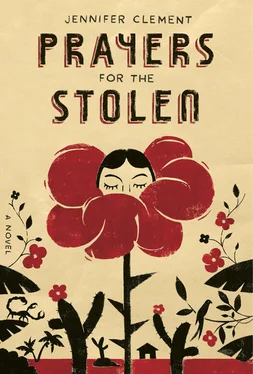She spoke softly and told me that the family who lived there had been away for over a week. She did not know when they’d be back. Her name was Jacaranda. As I walked behind her into the house, she smelled like coconut oil and oranges.
Jacaranda explained that the home belonged to the Domingo family, which consisted of Mr. Luis Domingo, Mrs. Rebeca Domingo, and their six-year-old boy, Alexis.
As Jacaranda walked me through the house I could feel my mother walking beside me. I could almost hear her spit on the white leather sofas with matching white leather throw pillows; spit on the glass tables that had bronze statues of ballerinas balanced on square stands; spit on the cold marble floor; and spit on the white tile kitchen floor and stainless-steel sink.
I could hear her say, This is all too clean, it hurts. And, as I looked around, I knew she was going to ask me to describe everything. She would want to know what I could steal and bring back to her. She would have looked at this house and said, We need to say a prayer for some dirt.
The living-room windows opened on a garden, which was set on a cliff that looked out over the ocean. There was a life-sized bronze statue of a horse under a large bougainvillea tree. To one side of the garden there was a swimming pool made of light blue tiles and carved from the ground in the shape of a turtle.
Jacaranda opened the glass door and led me out into the garden and down a path toward the servants’ rooms. We each had our own bedroom, but we shared a bathroom.
My bedroom contained a single bed and a chair and one small window that looked into the garage. The room smelled of a harsh, floral cleaning liquid. I looked out my window and could see a white Mercedes-Benz convertible and a black Escalade parked side by side in the garage.
Jacaranda told me I would have to wear a uniform also, like hers. She told me to change and instructed me to go to the kitchen once I was settled in so that she could make me some lunch.
I unpacked my few belongings and hid Paula’s photographs and notebook and Mike’s plastic bag under my mattress. There was no place else to keep them in the small room.
My cell phone rang. It was my mother.
I knew she stood at the clearing with her arm held up high in the air, trying to catch a signal. Her upper arm was burning from holding the phone up in the air and the effort of moving it back and forth between both hands.
It’s terrible there, right? she said.
Yes. It’s a filthy place.
Are you serious? What’s it like?
It’s fine.
But you do hate it?
Yes, I hate it.
The lies went back and forth between us. The truth was I already loved the clean house full of sea breeze and my mother wanted me back home immediately.
Stick it out, give it a chance, and stay.
Yes, I’ll try, Mama.
You can always come home if you don’t like it there.
The phone went dead. This always happened and meant that you had to dial back again and again. We all knew it was the reason Carlos Slim, the man who owned the phone company, was the richest man in the world. He made sure everyone in Mexico always had to call back.
What are you going to do? my mother used to say. Stop calling your family? Stop calling the doctor? Stop calling whomever it might be who might, just might, help you find a stolen daughter? Of course we all call back!
I turned off my phone and went to the kitchen. I walked across the cool white tiled-and-marble floor in my red plastic flip-flops from the jungle.
Jacaranda was making tortillas filled with cheese and raw green chilies on the stove and told me to sit down at the breakfast table. From the kitchen there was a view of the bay.
The table was set with three places. There were even three individual salt and pepper shakers next to tall crystal glasses of lemonade filled with slivers of lemon rind.
Jacaranda took an ice tray out of the freezer and dropped star-shaped ice cubes into our drinks.
She placed two tortillas on a plate in front of me and sat down. She had to squeeze in between the chair and glass table.
Once you’ve had babies, she explained, your stomach always wants to go back to that size as if it longs to have the baby back, she said.
Jacaranda placed her hands on her stomach and said with pride, I had eleven children.
As I ate she told me that she’d worked at this house for the past eight years. Before that she’d been a cleaning lady in a hotel for over forty years.
After you’ve worked in a hotel, there’s nothing about human nature you don’t know.
I listened to her as I ate the tortillas.
Most people are kind, she explained, and most women are unfaithful to their men.
I told her that my mother would dispute this information.
No, Jacaranda insisted. There is only one thing no one understands. Men get caught and women don’t.
Jacaranda also told me how people steal everything from hotel rooms, even light bulbs.
I knew this, of course. My mother had stolen light bulbs all the time.
Jacaranda remembered her very first job was to walk the streets, knock on doors, and ask poor women if they wanted to sell their braids. She would buy each braid for ten pesos back in those days. Sometimes the women would cut off their long braid or ponytail right then and there so Jacaranda always carried sharp scissors with her. Most of the time the braids were in boxes or bags in the women’s closets and drawers.
This was before everyone was making synthetic hair and bringing it in from China, she explained. This was when women still had long hair.
Most people don’t have really, really long hair anymore.
Yes, women used to grow their hair down to their knees. I worked for a woman here in Acapulco who had a small wig company. The hair that was bought from going door-to-door was laid out in three categories: short, medium, and long. Then the hair was disinfected and dyed and made into wigs and hairpieces. These hairpieces were very fashionable and were sold in Mexico City at a shop in the center of town.
Do you still have any of this hair? I asked.
No. But I used to imagine the rich ladies in Mexico dancing at parties and wearing the hair of a barefoot Nahua Indian from Guerrero.
One memorable day Jacaranda bought ten braids from one house alone. These were the braids from five generations of women. The colors ranged from black to gray to white.
All the braids were as long as my arm, Jacaranda remembered.
It’s hard to imagine.
I used to embroider with my own hair. I used it as thread, Jacaranda said.
My mother still uses her own hair to sew on a button or fix a hem.
Yes, I used to do that too.
Does someone else live here? I asked, pointing to the third place set at the table.
Yes. Julio, the gardener. He didn’t show up today, but will be back tomorrow.
After lunch Jacaranda gave me a tour of the house.
As we walked through the rooms, Jacaranda chewed on little pieces of paper. The white pulp appeared between her teeth every now and again. Jacaranda said she developed this habit as a girl as her mother was too poor to buy her chewing gum. She wanted her friends to think she was chewing real gum and it turned into a habit.
Every room seemed unlived in. The floors were so clean I knew I could drop a slice of an apple or a piece of toast on the floor and just pick it up and eat it. My skin was dirtier than the floor. There was no crumb for an ant and no spider for a scorpion. There were no cobwebs. And there was nothing personal in the house like a jacket hanging over the back of a chair or a rolled-up magazine on a table or photograph displayed in a frame.
The master bedroom had a king-sized bed that faced a huge window that looked over the garden and out over the ocean. There was a wooden figure of Jesus on the cross hanging on the wall above the bed. The room led off into one large bathroom that had a Jacuzzi in the center of the room and a massage table.
Читать дальше












